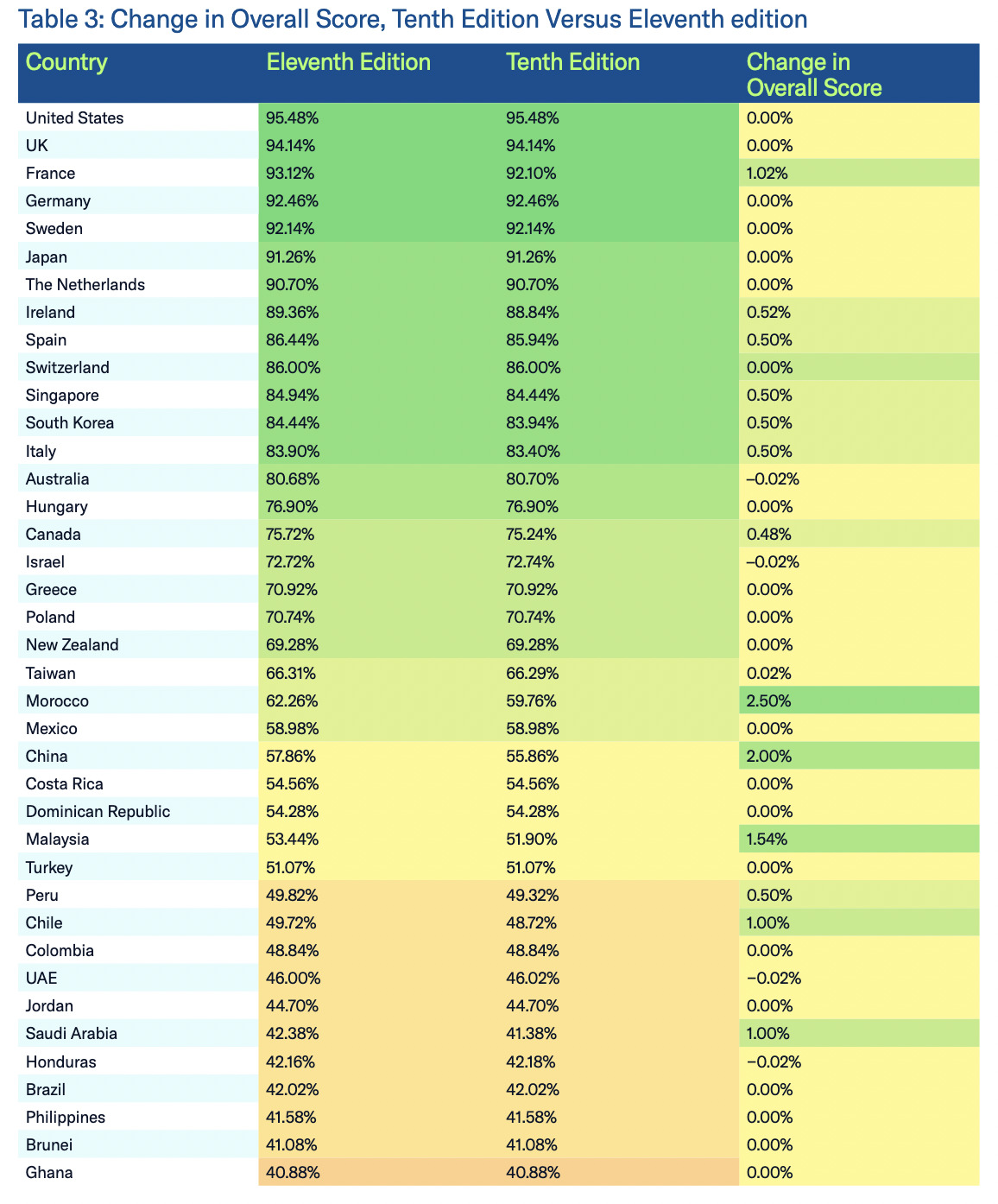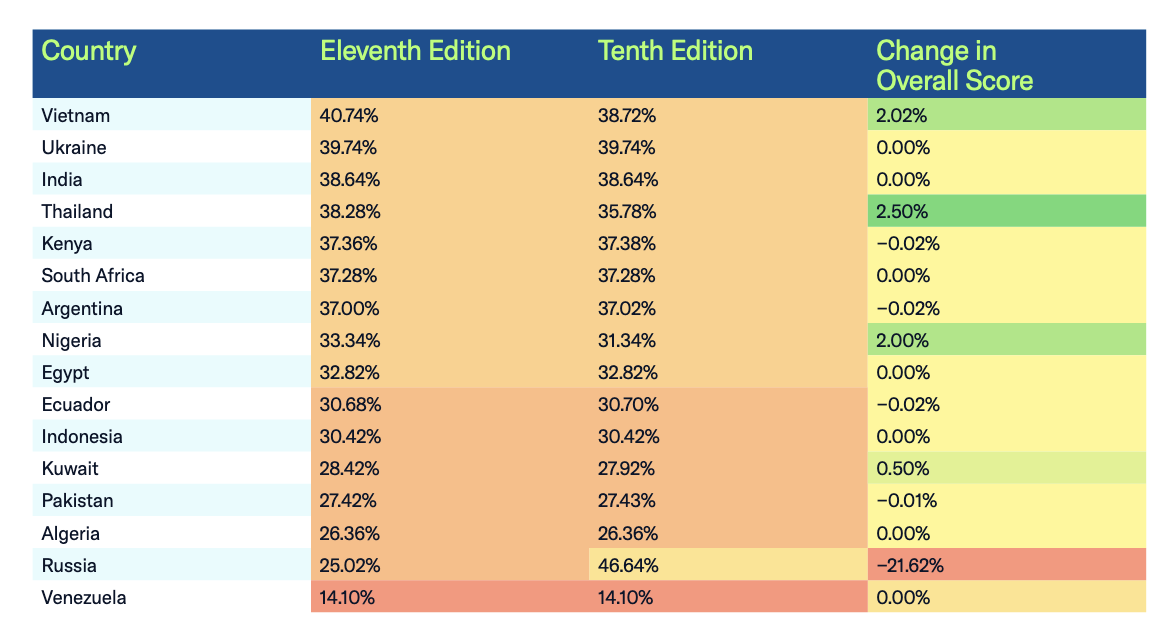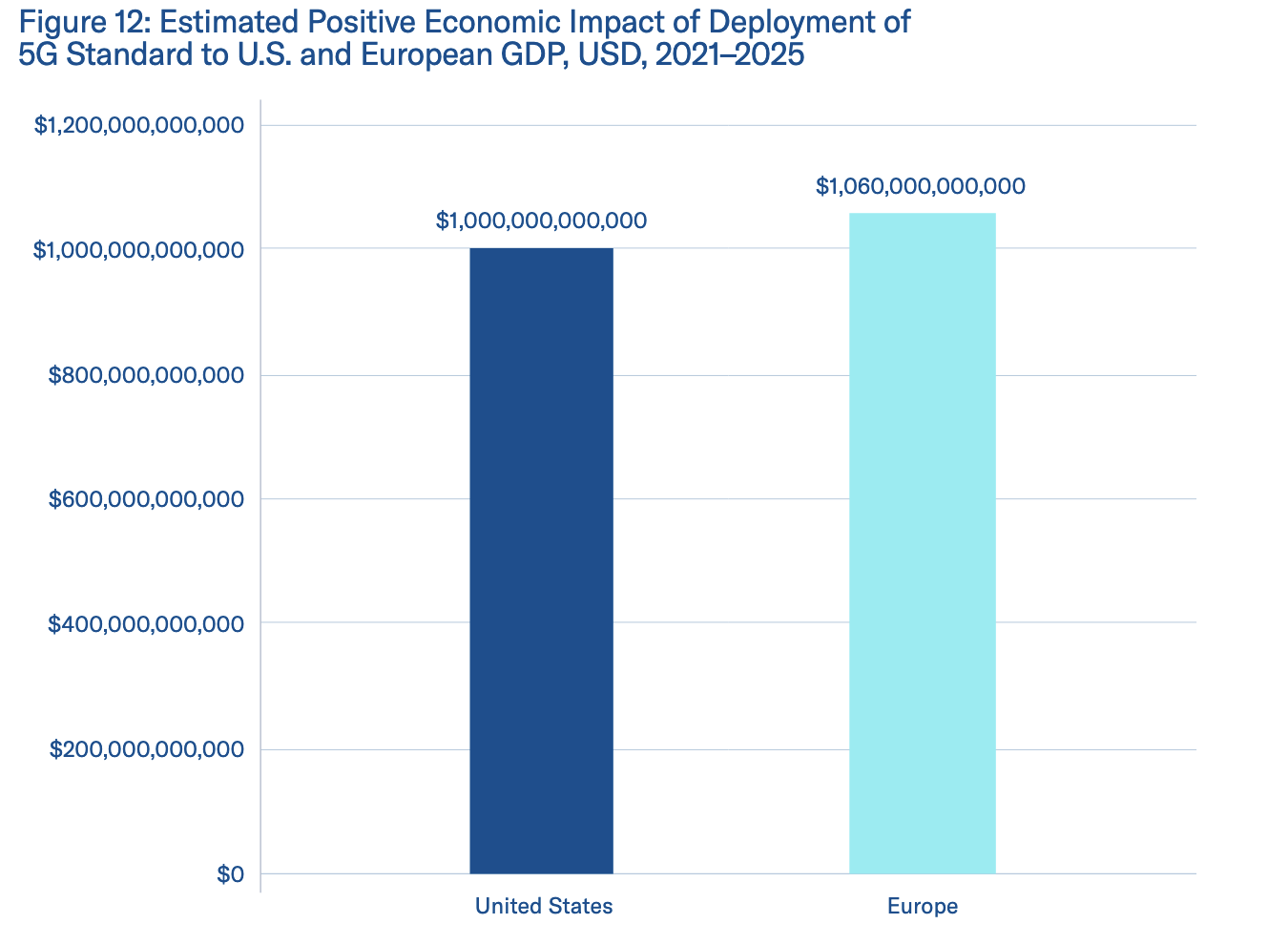“The price of the bad IP policies is steep by undermining access to new technologies, medicines, and creative entertainment worldwide.” – David Hirschmann, U.S. Chamber, GIPC
 The Global Innovation Policy Center (GIPC) of the U.S. Chamber of Commerce issued its 11th annual International IP Index today, striking what seems like a more dismal tone than usual compared with past reports. While 18 economies saw modest progress on IP protection improvements, 28 economies, including many of the high-scorers, like the United States and the United Kingdom, had a 0% change in score. Only two countries had a 0% change in the 10th edition of the Index.
The Global Innovation Policy Center (GIPC) of the U.S. Chamber of Commerce issued its 11th annual International IP Index today, striking what seems like a more dismal tone than usual compared with past reports. While 18 economies saw modest progress on IP protection improvements, 28 economies, including many of the high-scorers, like the United States and the United Kingdom, had a 0% change in score. Only two countries had a 0% change in the 10th edition of the Index.
The Index covers 55 economies that represent “most of the global economic output, together contributing over 90% of global GDP.”


Anti-IP Policy Proposals
The report warns in part that recent proposals at the multilateral and national levels threaten to weaken IP frameworks, specifically calling out the World Trade Organization’s (WTO’s) waiver of IP rights for COVID-related vaccine technologies; the United States’ consideration of various changes to the patent system in an attempt to reduce drug prices; and the European Union’s proposals to reduce the term of regulatory data protection, among others.
The Chamber’s press release announcing the Index read, “Storm Clouds Gather for Innovators and Creators as Intellectual Property Rights Face Policy Headwinds, New Report Warns.” David Hirschmann, the GIPC’s Executive Vice President, said:
“Recent actions by the United States, including price controls in the Inflation Reduction Act and IP-limiting proposals at the World Trade Organization, undermine our ability to champion the rights of creators and innovators. If the United States will not lead, who will? The price of the bad IP policies is steep by undermining access to new technologies, medicines, and creative entertainment worldwide.”
The Inflation Reduction Act of 2022 allows the U.S. Government to negotiate drug prices under a set framework based upon the amount of time a drug has spent on the market. A report published in July 2022 found that such measures have significant, negative effects on patient access to new therapies because they severely curtail funding for research and development.
The GIPC has come out strongly against the United States’ May 2021 decision to back a waiver of IP rights for COVID technologies, with its Senior Vice President, Patrick Kilbride, commenting in June 2022 that “instead of addressing genuine last-mile challenges, the two years spent discussing IP waivers has been a waste of valuable time and a missed opportunity to tackle the real problems.”
The 2023 Index dedicates a large section of the report to the COVID IP waiver decision as “taking a wrong turn,” as well as to many EU countries’ IP rights policies as generating “mixed signals.”
Not All Bad
Last year’s International IP Index analyzed ten years of data to reveal that the global IP environment has steadily improved overall, including during the COVID-19 pandemic, and that emerging economies are particularly making a conscious decision to bolster their IP regimes. This year, the focus is largely on a potentially stagnating global IP economy—though there were some bright spots.
There was considerable action taken in 2022 against piracy and copyright-infringing content online, with major strides made in Peru, Brazil, Canada and the United States. The report also touts the positive economic impact of 5G technologies, enabled by strong IP frameworks. According to the Index, 5G deployment has contributed over $100 billion to U.S. GDP, and “studies estimate that the 5G standard will contribute $1.5 trillion to U.S. GDP and create or transform 16 million U.S. jobs by 2025.”
However, the report warns that continued deployment of 5G and other information communication technologies may be threatened by trends toward policies that create barriers to licensing and that target standard-essential patents (SEPs).

While the biggest players’ scores stayed largely flat, there were some slight improvements. France’s score jumped up by 1.02% to 93.12%; China’s score increased by 2% to 57.86%; and Thailand and Morocco’s scores both jumped up by 2.50%. The United States had a 0% change, remaining at 95.48%, while Russia’s score plummeted 21.62% due to its wartime IP policies, which were implemented to punish international rightsholders.

![[IPWatchdog Logo]](https://ipwatchdog.com/wp-content/themes/IPWatchdog%20-%202023/assets/images/temp/logo-small@2x.png)

![[Advertisement]](https://ipwatchdog.com/wp-content/uploads/2024/04/Patent-Litigation-Masters-2024-sidebar-early-bird-ends-Apr-21-last-chance-700x500-1.jpg)

![[Advertisement]](https://ipwatchdog.com/wp-content/uploads/2021/12/WEBINAR-336-x-280-px.png)
![[Advertisement]](https://ipwatchdog.com/wp-content/uploads/2021/12/2021-Patent-Practice-on-Demand-recorded-Feb-2021-336-x-280.jpg)
![[Advertisement]](https://ipwatchdog.com/wp-content/uploads/2021/12/Ad-4-The-Invent-Patent-System™.png)







Join the Discussion
No comments yet.